For the first time in British history, there are probably now more atheists and agnostics in Torbay than believers in God. Almost half the country’s population now say they have no religion – referred to as ‘Nones’ – almost double the figure of 25% recorded in the 2011 Census. People defining themselves as Christian, including Anglicans, Catholics and other denominations, make up 43.8% of the population – lower than the 48.8% of Nones. This change, from belief to non-belief, seems to be happening extraordinarily quickly.
There’s other evidence. The number of people attending Church of England services each week has for the first time dropped below 1 million – accounting for less than 2% of the population – with Sunday attendances falling to 760,000. Both the Anglican and Catholic churches are struggling to retain people brought up as Christians. Four out of ten adults raised as Anglican – and a similar number of those raised Catholic – now identify as having no religion.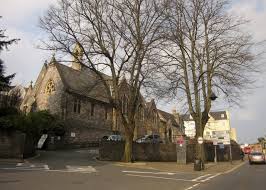
The Church of England expects attendance to continue to fall for another 30 years as its congregations age and younger generations reject and question organised faith. Christian churches are also generally failing to attract new recruits from atheist or agnostic backgrounds – the vast majority of converts to the mainstream churches come from other Christian denominations.
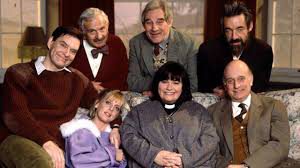 There may also be a change in our national view of religion with comedy often indicating how we see the world. Note the change in mood from the quaint rural optimism of ‘The Vicar of Dibley’ to the more recent urban cynicism of ‘Rev’.
There may also be a change in our national view of religion with comedy often indicating how we see the world. Note the change in mood from the quaint rural optimism of ‘The Vicar of Dibley’ to the more recent urban cynicism of ‘Rev’.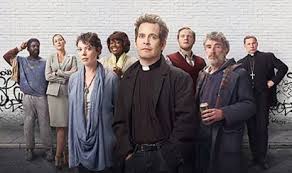
The Nones aren’t a cohesive group, however. There are avowed atheists, others are agnostic, many simply don’t want to state a preference, some just don’t care at all, while there may be many with less-easily defined spiritual beliefs.
The rise of the Nones seems to be happening around the world with recent studies all showing a trend. There were over 1.1 billion non-religious people in the world in 2010, and that number is expected to increase to over 1.2 billion by the year 2020. 19% of Spaniards, 24% of Danes, 26% of Slovenians, 27% of Germans and Belgians, 34% of Swedes, and 40% of the French, claim to not believe in “any sort of spirit, God, or life-force.”
In the United States, somewhere between 23%- 28% of American adults have no religious affiliation. As it is across the world, non-belief is age-related – among Americans in their 20s, over 35% are non-religious. In Canada, back in 1991, 12% of adults stated “None” – today that is up to 24%. In Australia, 15% of the population said they had no religion in 2001, and it is up to 22% today. In New Zealand, 30% of the population claimed no religion in 2001, but it had risen to 42% in 2013.
Over 50% of Chinese adults are supposed to be atheists – though in Communist states religion is officially oppressed so accurate information is hard to obtain. At the other extreme, in the Muslim world promoting atheism is often a crime – in 13 Islamic nations it is punishable by death. Yet, even here there are still indications of a growing secularism.
The reasons for this rapid change aren’t clear. One suggestion is the increasing involvement of women in the workforce. Around the world women are more likely to be religious than men, though that changes when women have more opportunities – when women join the labour force they become more like men in their beliefs about the existence of God.
It may also be that people become Nones due to financial security. European countries with a stronger social safety net are more secular than the United States, for instance, where poverty is more common and a medical emergency can cause bankruptcy. Atheism is also tied to educat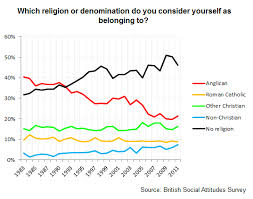 ion with non-believers often having a college or university level degree. Additionally, secularization seems linked with internet use. As access to the web, allowing information sharing and communication, becomes more common across the world, secularism is likely to grow.
ion with non-believers often having a college or university level degree. Additionally, secularization seems linked with internet use. As access to the web, allowing information sharing and communication, becomes more common across the world, secularism is likely to grow.
It’s also possible that, as western society has become more liberal in its attitudes to equal marriage, sexual identity, contraception and abortion, the persisting conservative beliefs of some faiths appear out-of-touch with younger people in particular. Specifically, very public arguments over whether gay people should be allowed to marry and whether women should be priests possibly caused lasting damage to the image of the established Church.
This change may well continue. In the past the primary source of new believers would be through the family – religious parents raised religious children. Now with the rise of the Nones, children are less likely to be exposed to religious views of the world.

This doesn’t mean, however, that the planet is becoming atheist. In many parts of the world, sub-Saharan Africa in particular, populations are growing so quickly that the Nones share of the global population will shrink in 25 years. Religious people have more children than secular people and those nations with the highest birth-rates are the most religious. Accordingly, the growth of non-belief will probably level off within a few decades. Meanwhile Islam will continue to grow, becoming the world’s largest religion by 2050. In effect, we seem to be seeing a secularising west and a rapidly growing rest.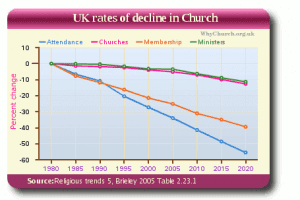
Let’s bring this closer to home. In 2011 everyone in the Bay was asked their religion – the results are shown below. The main difference between us and the rest of the country was that we had a slightly higher proportion of Christians at 61%, in comparison with the national average at 59%. This is probably down to our aging population – the rest of England is, in terms of age, where Torbay was in 1980. Age is also linked to where religious believers live. A closer look at the Bay reveals that, for example, Cockington and Chelston had almost 50% non-believers, while more affluent and elderly Wellswood had 15%. We also had smaller numbers of Muslims – the only parts of the Bay with the national average number of Muslims was around Torbay Hospital, indicating the contribution of Muslim health workers.
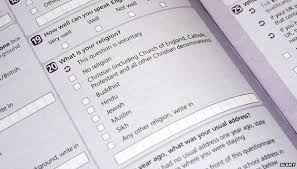 If we take the national research and apply it to the Bay, there will have been a decrease in the numbers of Christians in the past 5 years since the Census was taken. At a 2% annual decrease it’s reasonable to say that the majority of those of us living in the Bay would now describe ourselves as having no religion. This is the first time Torbay hasn’t been ‘Christian’ for well over a thousand years.
If we take the national research and apply it to the Bay, there will have been a decrease in the numbers of Christians in the past 5 years since the Census was taken. At a 2% annual decrease it’s reasonable to say that the majority of those of us living in the Bay would now describe ourselves as having no religion. This is the first time Torbay hasn’t been ‘Christian’ for well over a thousand years.
Is this a good or a bad thing, or does it even matter?
Who we are in Torbay – the 2011 Census
Christian 82,924
No Religion 35,535
Religion not stated 10,110
Muslim 521
Jedi Knight 500
Buddhist 389
Spiritualist 246
Pagan 177
Hindu 128
Jewish 109
Mixed religion 70
Sikh 41
Wicca 40Spiritual 36
Taoist 11
Rastafarian 9
Pantheism 7
Own belief system 6
Universalist 6
Witchcraft 4
Deist 3
Baha’i 5
Satanism 5
New Age 4
Scientology 3
Heathen 3
Native American Church 2






























